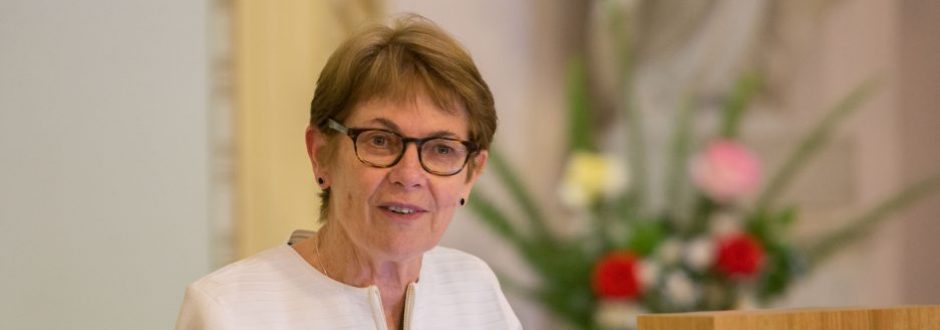Solitude doesn’t just happen. Like a garden, it needs cultivating. It requires a tolerance for time spent alone, a tolerance for silence and stillness, writes Congregational Leader Patty Fawkner SGS.
Have you heard of Google’s Ngram Viewer? It’s a nimble tool which provides a graph of the frequency of particular words in English literature over the past 200 years. It’s fascinating to see when new words emerge and become prominent, and when words fall out of favour.
Take, for example, the words “loneliness” and “solitude”. Since 1800, the appearance of “solitude” in literature has declined dramatically, by 300 per cent. Compare that with “loneliness”, which has increased by a mammoth 1700 per cent.
These statistics caught my attention in a book called How We Love: A Formation for the Celibate Life by John Mark Falkenhain OSB, a Benedictine monk and clinical psychologist. The book explores skills for living the celibate life, one of which is solitude.
It occurs to me that solitude is a skill for life, for celibates and non-celibates alike, a skill which could be a healthy antidote for what has been described as an epidemic of loneliness.
But let’s not be too quick to set up a simplistic dualism – loneliness bad; solitude good. Like all our emotions, the feeling of loneliness contains an important message of wisdom.
Loneliness, according to neuroscientist Dr John Cacioppo, like other primal needs for survival, is an evolved signal that something is not right, and a response is called for. Hunger tells me I’m in need of food and thirst tells me I’m in need of drink. Loneliness tells me that I’m in need of human connection.
The gift of loneliness, Cacioppo suggests, is that it helps bind us together and helps keep us bound together. Recognising my own loneliness and my need for connection can help me empathise with others and can move me beyond self-absorption and self-interest.
However, if loneliness does not trigger healthy reconnection, it is dangerous. We saw that during extended lockdowns caused by the COVID-19 pandemic. Loneliness impacted both the mental and physical health of millions of people.
I say “healthy” reconnection. Through social media, as a society we have never been more connected, and we have never been so lonely. It’s obvious that well-being is not the product of the quantity of connections but is reliant upon the quality of these connections.
A few good relationships will satisfy our human need for connection in a way that 4000 friends on Facebook cannot.
We know that loneliness isn’t triggered by the physical absence of others, because we’ve all experienced feeling lonely within a group or crowd. It’s the lack of intimacy that causes so much psychological, physical and spiritual damage. It is also the lack of intimacy with our deepest self, and this is where solitude comes in.
Falkenhain says solitude is a transformed experience of loneliness. It is “the chamber we enter after passing through the doorway of loneliness.” But we may baulk at making this journey, for as Blaise Pascal observed 350 years ago, “I have discovered that all the unhappiness of men (sic) arises from one single fact in that they cannot stay quietly in their own chamber.”
Solitude doesn’t just happen. Like a garden, it needs cultivating. It requires discipline and intentional care to “stay quietly in my own chamber”. It requires a tolerance for time spent alone, a tolerance for silence and stillness. Countless mystics have attested that solitude requires a stilling of the mind and reducing, as far as possible, external noise.
Surely, the “noisiest” factor in my environment is my engagement with my personal device replete with emails, social media, games, news feeds, my own print and video library, etc, etc, all enticingly available at my fingertips. It takes incredible discipline to limit time spent on such devices.
Time spent alone, finding a quiet space to simply be, possibly taking a nature walk as I listen to the sounds around me rather than a podcast, can help me reconnect with myself and get in touch with my thoughts, feelings and desires.
Solitude enables me to come home to myself and enjoy my own company. It is an act of love towards myself, an investment in who I am and who I’m called to be.
Solitude can come in different forms. I knew a mother of five children who told me that her daily sacred time was a late afternoon bath, her precious not-to-be-disturbed time. Surfers can experience solitude waiting for the next wave, as can bush-walkers surrounded by the beautiful Australian bush.
I have experienced solitude during a period of quiet reflection or a time of retreat. I have discovered that enormous gifts abound when I give myself time and space away from my normal activities. It’s as though I relax into being as I resist asserting my ego that often accompanies my doing and the roles and responsibilities that are mine.
Solitude puts me in touch with what lies below my ego, to get in touch with my deepest self, my soul. And it’s at this deeper level that I experience a counter-intuitive gift of solitude. Where loneliness is the experience of my need for connection, solitude is the realisation and experience of my connectedness, my oneness with God, with others and with the natural world.
This can sound idyllic, but the much-loved spiritual writer Henri Nouwen says that solitude can be a place of real struggle, a place to delve beneath the surface, a “place of conversion, the place where the old self dies and the new self is born, the place where the emergence of the new man and the new woman occurs.”
Solitude is struggle; solitude requires discipline. Sure. But solitude is pure gift to myself and to others.
